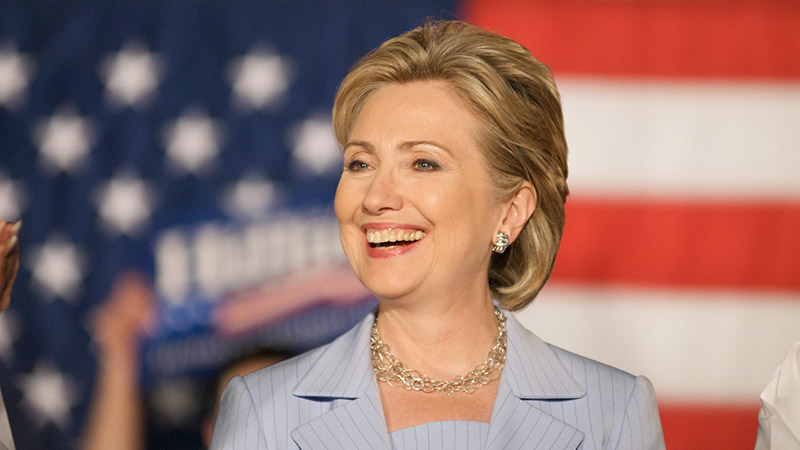Climate change barely featured at the US Republican National Convention in Cleveland, except in Donald Trump’s coded attack on the clean power plan.
This week it’s the Democrats’ turn in Philadelphia and you can expect building a low carbon economy to feature on the agenda.
Hillary Clinton has picked Virginia senator Tim Kaine as her running mate, seen as a safe centrist. He doesn’t tick all the climate hawk boxes, having opposed the Keystone XL pipeline but supported fracking and Atlantic oil drilling.
All the same, this could be America’s strongest ever climate platform, with Clinton promising to deliver carbon pricing, a climate test for new fossil fuel infrastructure and priority to renewables.
More than 900 campaign groups coordinated by Americans Against Fracking are determined to hold her to that, marching on Sunday to demand a “clean energy revolution”.
Yes, Kaine voted against KXL, but his support for fracking won’t energize the climate base. Clinton needs to stake out a clearer position.
— Jamie Henn (@Agent350) July 23, 2016
Vienna: a Paris sequel?
A deal on phasing out the potent warming HFC gases used in air conditioners is within reach, after talks wrapped up in the Austrian capital on Saturday.
A “high ambition coalition” of rich, poor and emerging economies called for an “early freeze in HFC growth” in developing countries by 2021, writes David Doniger, an adviser to US NGO Natural Resources Defense Council.
According to Durwood Zaelke, president of the Institute for Governance and Sustainable Development a deal is within reach when UN talks restart in Kigali, Rwanda in October.
“Almost all parties converged on a narrower set of options on key issues,” he said in an email. “India, however, remained the outlier, showing little evidence of the promise Prime Minister Modi made to President Obama to finish an ambitious HFC amendment this year.”
#HighAmbitionCoalition and others gather in Vienna to push for a #HFCPhasedown – Statement https://t.co/jEfUJMtjxX pic.twitter.com/vrGB8rrpQx
— Miguel Arias Cañete (@MAC_europa) July 22, 2016
A speedy HFC phasedown can avoid the equivalent of up to 100 billion tons of carbon dioxide by 2050, said Zaelke.
Ibrahim Thiaw, deputy head of the UN environment body, told Climate Home there was a “very positive atmosphere”.
“We hope the political will expressed in Vienna will be enhanced and amplified in other parts of the world,” Thiaw said.
“We are hopeful we have a good agreement in Kigali but it will only be as good as it is implemented – and therefore beyond the agreement we hope the technology will be there, the financial resources will be there and all countries will implement the decisions they have made.”
A number of rich countries have promised to continue funding the Montreal Protocol, which will oversee the switch to safer coolants, he added.
That is critical to close the divide between India, which wants a 15-year transition, and the US proposal to end HFC production within five years. Delhi argues the substitutes – many patented by American chemical companies – are too expensive to meet huge latent demand for air conditioning.
Scorching summer
As if to underline the importance of getting it right, large swathes of central and eastern US are on heatwave alert this weekend, while the Arabian peninsula broils.
The mercury hit 54C in Mitribah, Kuwait last Thursday. If confirmed, it will be the highest land temperature recorded outside of Death Valley, California.
And it’s a sweltering few months ahead for the US, according to weather and climate agency NOAA. “Oppressive summer heat” will affect large parts of the country in the coming week, with temperatures hitting 45C in some places.
Get used to heat; Unusual NOAA forecast for Aug-Sept-Oct. Entire Lower 48 & AK predicted to have above normal temps pic.twitter.com/FANbEp7kO6
— @borenbears (@borenbears) July 21, 2016
Ratification watch
Austria’s parliament approved the Paris climate deal last week (Vienna will formally join with all EU member states) as did Peru (see below).
https://twitter.com/pablopenaa/status/756576407258529793
Scientists say…
Look out for papers Monday on how climate disasters can ignite ethnic tensions and key questions around the 1.5C warming threshold included in the Paris Agreement.
Brexit test
Swedish utility Vattenfall has given its vote of confidence in UK clean energy policy outside the EU by deciding to invest 3 billion krona (US$350m) in a 92MW windfarm off the coast of Scotland. As a bonus, it enraged Donald Trump, who has been complaining it will spoil the view from one of his golf resorts.
France’s EDF faces a tougher call on whether to go ahead with its Hinkley Point C nuclear plant. Widely criticised as too expensive for UK billpayers and a stretch for the company’s finances, the £18 billion (US$24bn) project nonetheless has top level political support on both sides of the Channel.
Its oft-deferred final investment decision is due at a board meeting on Thursday, fuelling speculation it will get the green light.
